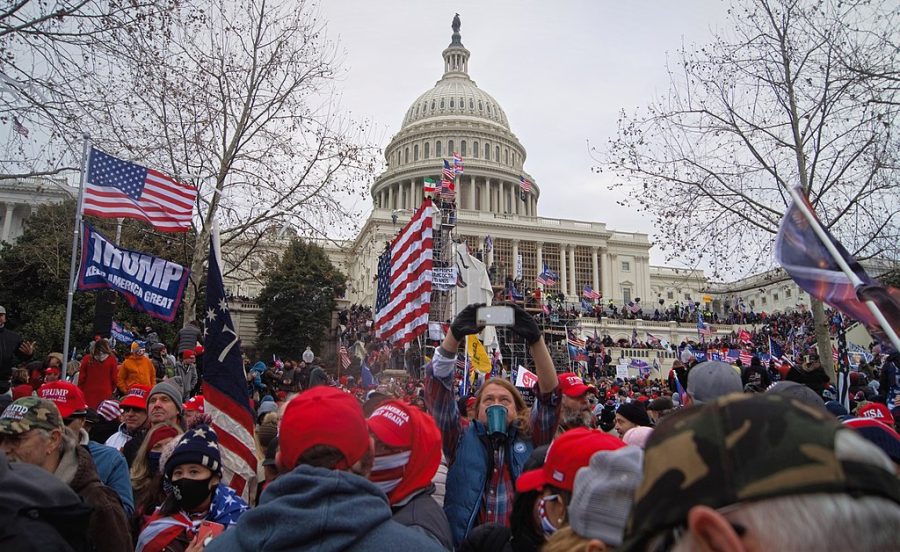One Year Later, Nation Fights Internal And Foreign Conflicts
Tyler Merbler from USA, CC BY 2.0
Rioters outside the US Capitol building holding US flags and “Make America Great Again” flags.
January 24, 2022
One year after the Capitol insurrection, many are still concerned the future of American democracy is at risk while others are hoping the country can begin to heal and move on.
On January 6th, 2021, the United States Capitol was attacked by a group of protesters, hoping to overturn the results of the 2020 election while the Electoral College votes were being cast. Former President Donald J. Trump has called the 2020 election stolen on countless occasions, and his supporters have echoed that concern. On the one year anniversary, Trump released a statement, following President Biden’s speech. The former president continued to express his anger at the result of the election.
“The complicit media just calls it the Big Lie, when in actuality the Big Lie was the election itself,” said Trump.
Many elected officials along with Americans are concerned that these false claims are leading to a much bigger problem for the future of democracy. According to the National Public Radio, a survey conducted by the Chicago Project on Security and Threats reveals that the demographic which supports political violence has changed. The individuals on average are older, more educated, and more economically stable than the right-wing people that have been arrested recently.
Foreign countries are also beginning to pick up on the vulnerability of America during a time of internal conflict. As tension rises in China and Russia, it is clear that they pose a threat to the United States.
“This is a time when our country needs to be united against China’s advances and Russia’s aggression,” said Trudy Rubin of the Philadelphia Enquirer.
Members of NATO are worried that without the leadership of the U.S., they may not be able to fight the threats of these growing powers. With mounting political divides and debates over voting rights, America is distracted and trying to hold itself together.
Currently, Republicans are working to pass laws which restrict accessibility to voting, and in some cases change the system of voting within a state. Many Republicans fear the rights of white people are being taken over by the rights of minorities according to Odette Yosef of the National Public Radio. These voting changes seem to be in hopes of continuing to get Democrats out of power.
“The best way to ‘show respect’ for voters is telling them the truth,” said Mitt Romney (R), a senator from Utah.
While many Republicans seem to continue to shy away from the events of January 6th, Democrats are concerned that this may only be the beginning. Democratic Leader, Chuck Schumer, expressed that historically, mobs tend to be the start of danger for democracies. He, along with Vice President Kamala Harris, also reminded Americans that they cannot shy away from the severity of the Insurrection. According to Ronn Blitzer of Fox News, Kamala Harris called January 6th one of the three darkest days in American history and urged Americans to recognize it as such.
“Harris then asserted that what happened at the Capitol that day continues to be a threat to American life…,”said Blitzer.
According to the BBC, Florida Governor Ron DeSantis strongly disagreed, sharing that most Floridians are not concerned about the anniversary. Senator Lindsey Graham echoed DeSantis’ words saying that President Biden had politicized the event. Graham was one of the many Republicans who distanced themselves from former President Trump following the insurrection, but later fell back into his favor.
It is unclear what the path to reunification will be following the events at the United States Capitol, however, it is clear that the country needs to not only focus internally, but also focus internationally. If not, the American people may lose democracy as they know it, which is something that no political party wants.





